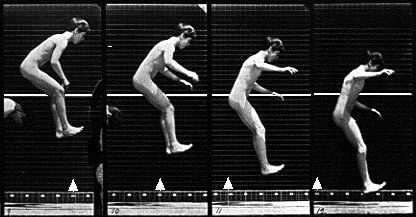
Fashioning the Body: Versions of the Citizen, the Self, and the Subject
The Evergreen State College | Fall 2007-Winter 2008
User Login |
Concept Rhyming Paper #1
Foucault: The History of Sexuality
"Discourse" would seem to be a rather simple and easily defined word. In the context of Foucault's The History of Sexuality, it is not. Wading through the murky waters of Foucault's alternative word meanings has been mentally exhausting. However, I found an enlightening bit of information in the Pocket Oxford English Dictionary; The definition of the word "discourse" reads: "Discourse: 1. Written or spoken communication or debate;2. A formal discussion of a topic; 3. to write authoritatively about a topic." It goes on to describe the latin origin, "discursus," which means, "running to and fro." Visualizing the movement is what brought me a better understanding of Foucault's usage of the word. Discourse is a mobile term; it shifts and is molded by Foucault's writing style. Throughout the majority of the seventy-three pages I have read so far, Foucault utilizes the word discourse to describe the ongoing discussion of sexuality. Early on he informs the reader that, "...the essential thing is the existencein our era of a discourse in which sex, the revelation of truth, the overturning of global laws, the proclamation of a new day to come, and the promise of a certain felicity are linked together"(7). This tells me that discourse, as he describes it, is a movement of human sexuality, bringing it back to the place it once held in the seventeenth century. This is where he begins his discussion of this particular topic. At this time, he says, "Codes regulating the coarse, the obscene, and indecent were quite lax compared to those of the nineteenth century"(3). All of which describes discourse as it moves throughout time. In the nineteenth century sexual discourse became a "screen-discourse"(53). In this form of discourse one had to become selective when speaking about sex or sexuality. The language chosen or not chosen was of the utmost importance. "...it was a new regime of discourses. Not any less was said about it; on the contrary. but things were said in a very different way; it was different people who said them, from different points of view, and in order to obtain different results...There is not one but many silences, and they are integral part of the strategies that underlie and permeate discourses"(27). This was an interesting way to describe discourse. He speaks of it as though it were a game in which the rules are constantly changing. This means that in order to participate in the conversation you had to first familiarize yourself with the rules and regulations. This new discourse, "...has coded contents and qualified speakers"(29). Going back to the word's Latin origins helps to make sense of his describing discourse as some sort of strategic game; "discursus: running to and fro" Imagining this game in which society says that in order to play, "One had to speak of sex; one had to speak publicly and in a manner that was not determined by the division between the licit and illicit, ....one had to speak of it as of a thing to be not simply condemned or tolerated but managed, inserted into the systems of utility, regulated for the greater good of all, made to function according to an optimum"(24). This game, however, became too unruly and had to find a higher form of control. In the eighteenth century discourse became a form of communication powerful enough to inspire movement or change. Transforming sex into discourse became a form of communication powerful enouggh to inspire movement or change. Transforming sex into discourse made it so much more than it had been before. "...these discourses on sex did not multiply apart from or against power, but in the very space and as a means of its exercise"(32). So, although there was an attempt at policing the discourse on sex the quantity of various discourses has, "...been multiplied rather than rarefied...it has also, in a more fundamental way, ensured the solidification and implanttion of an entire sexual mosaic:(53). This is what created a space in which the act of discussion makes sex an acceptable topic of conversation. So it seems as though screening or regulating discourse on sexuality is what, in a roundabout way, makes it into a suitable bit of conversation. It all comes full circle, like a cog in a machine; a discursive machine. This is ultimately what discouse becomes. Foucault says, "The society that emerged in the nineteenth century...did not confront sex with a fundamental refusal of recognition. On the contrary, it put into operation an entire machinery for producing true discourses concerning it"(69). Throughout Foucault's writing the topic of discourse is a somewhat fluid term. Sometimes it is true to its dictionary definition, sometimes it takes on another form of the word as it is molded and shaped by the imagery produced by Foucault's writing style, and sometimes goes as far back as its Latin origins. But as Foucault reminds us, "This sceme for transforming sex into discourse had been devised long before in an ascetic and monastic setting"(20). Meaning that as much as it has changed and been changed by time the foundations for the true meaning of discourse were laid down long before the greater society began the disursive transition.
Submitted by Cerise on Thu, 11/29/2007 - 2:25am. Cerise's blog | login or register to post comments | printer friendly version
|
Who's onlineThere are currently 0 users and 1 guest online.
Events
|
|||||||||||||||||||||||||||||||||||||||||||||||||